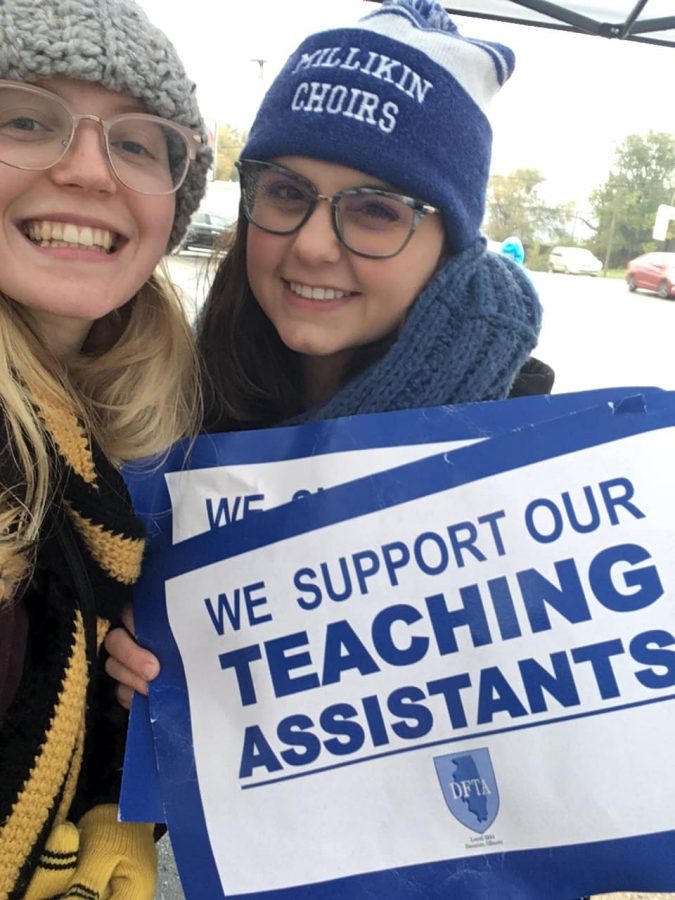Decatur Area Teaching Assistants Strike
Senior Music Education majors Alissa Kanturek and Nikki Sawilchik show their support as Decatur’s TAs go on strike. Photo by Alissa Kanturek
Since April of 2019, teaching assistants, or TAs, have been attempting to work with the Decatur Public Schools Board of Education to negotiate a fair contract for the current school year.
Teaching assistants include classroom assistants, special education assistants, interpreters, licensed practical nurses, and hearing-vision technicians, to name a few. All are integral parts of keeping a school functioning and supporting students.
But they have been unable to come to an agreement. The union representing teaching assistants, the Decatur Federation of Teaching Assistants, or DFTA, and the Board of Education were required to post their proposals back in September. Currently, they are still operating on a contract extension from the previous year.
There were several issues that DFTA addressed to the board to ratify. These issues included increasing insurance costs with a low salary, unpaid leave for family emergencies, inability to tour the new facilities that assistants may be transferred to in the upcoming district merger, minimum six-hour workdays, payment of fees to upkeep licensing, and unclear assigned duties.
The salary of a teaching assistant in Decatur varies between $20-26,000. For single-payer insurance, the cost is $900 annually. But for family coverage, costs are about $3,300. These costs are paid over 18 pay periods, which is over the nine months out of the year that TAs work.
Under the district’s proposal, they offer a few options for insurance. One is the “gold” plan. Monthly premiums would increase until the contract’s end in 2023. By that time, a single-payer’s premium would reach $1,471.56. Family coverage would be looking at $8,159.28. The district offered other ‘levels’ of plans with varying unfeasible premiums and deductibles.
As of October, no agreement had been reached. TAs finally held a strike between October 29-31. They striked outside of their respective schools in frigid temperatures and rain to prove their dedication to the cause.
Though the TAs striked and left their classrooms for those days, it was bittersweet. They did not want to leave their students without aid, but they needed to prove a point. A retired teacher-turned TA, Kari Boyd, who participated in the strike outside of Baum Elementary, commented, “I don’t want to be out here. I want to be inside with students.”
Due to the striking, over 500 students went without aid for those days. Programs, including pre-school and special needs programs, were closed due to lack of assistants.
After the strikes, the district notified the TAs who were not at work during the three days that their insurance would be cancelled under the guise that, in order for the district to pay its share of the insurance, employees must work a certain number of hours per week. To keep their insurance, employees would have to pay the whole price for the rest of the year.
The president of the DFTA, Paula Busboom, called this act “childish.” She also commented, “They’ve escalated their tactics to the point that they are playing with people’s lives. It’s unfair and wrong. Our members work to provide quality education assistance to our students. We simply want to negotiate a fair and reasonable contract that allows us to meet our own basic needs. We stand ready to bargain.”
Busboom shared that the federation had reached out to their mediator to notify the board of their desire to negotiate, but had not yet heard back from them.
Not all TAs in Decatur participated in the strike. Striking means no pay for those days and for some, it may not have been possible to forfeit, even if they believed in the cause.
As of now, the striking is suspended in order to give Decatur students the support they deserve. But it is quite possible striking may resume if a suitable agreement is not reached in the near future.

